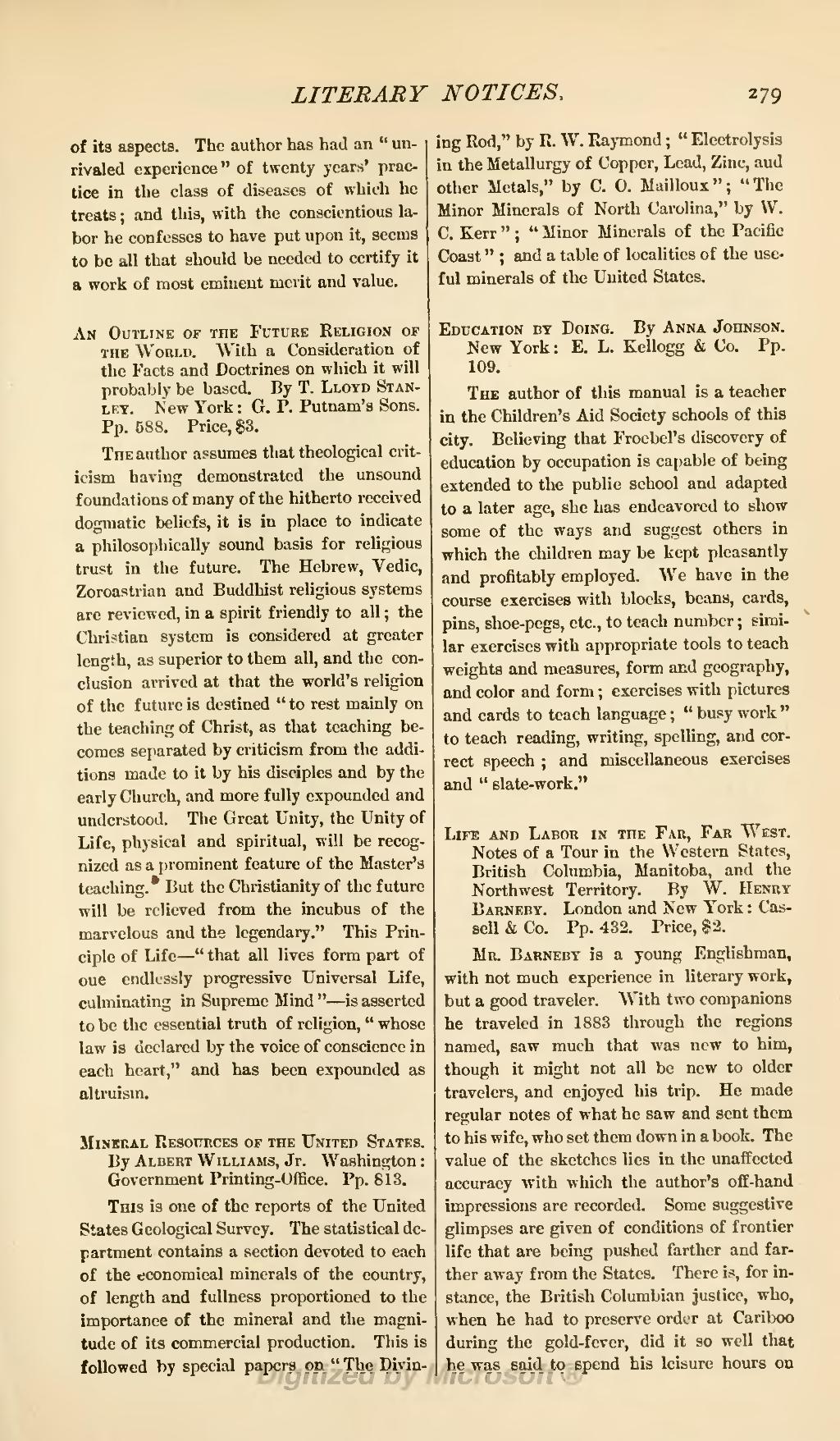of its aspects. The author has had an "unrivaled experience" of twenty years' practice in the class of diseases of which he treats; and this, with the conscientious labor he confesses to have put upon it, seems to be all that should be needed to certify it a work of most eminent merit and value.
An Outline of the Future Religion of the World. With a Consideration of the Facts and Doctrines on which it will probably be based. By T. Lloyd Stanley. New York: G. P. Putnam's Sons. Pp. 588. Price, $3.
The author assumes that theological criticism having demonstrated the unsound foundations of many of the hitherto received dogmatic beliefs, it is in place to indicate a philosophically sound basis for religious trust in the future. The Hebrew, Vedic, Zoroastrian and Buddhist religious systems are reviewed, in a spirit friendly to all; the Christian system is considered at greater length, as superior to them all, and the conclusion arrived at that the world's religion of the future is destined "to rest mainly on the teaching of Christ, as that teaching becomes separated by criticism from the additions made to it by his disciples and by the early Church, and more fully expounded and understood. The Great Unity, the Unity of Life, physical and spiritual, will be recognized as a prominent feature of the Master's teaching. But the Christianity of the future will be relieved from the incubus of the marvelous and the legendary." This Principle of Life—"that all lives form part of one endlessly progressive Universal Life, culminating in Supreme Mind"—is asserted to be the essential truth of religion, "whose law is declared by the voice of conscience in each heart," and has been expounded as altruism.
Mineral Resources of the United States. By Albert Williams, Jr. Washington: Government Printing-Office. Pp. 813.
This is one of the reports of the United States Geological Survey. The statistical department contains a section devoted to each of the economical minerals of the country, of length and fullness proportioned to the importance of the mineral and the magnitude of its commercial production. This is followed by special papers on "The Divining Rod," by R. W. Raymond; "Electrolysis in the Metallurgy of Copper, Lead, Zinc, and other Metals," by C. O. Mailloux; "The Minor Minerals of North Carolina," by W. C. Kerr; "Minor Minerals of the Pacific Coast"; and a table of localities of the useful minerals of the United States,
Education by Doing. By Anna Johnson. New York: E. L. Kellogg & Co. Pp. 109.
The author of this manual is a teacher in the Children's Aid Society schools of this city. Believing that Froebel's discovery of education by occupation is capable of being extended to the public school and adapted to a later age, she has endeavored to show some of the ways and suggest others in which the children may be kept pleasantly and profitably employed. We have in the course exercises with blocks, beans, cards, pins, shoe-pegs, etc., to teach number; similar exercises with appropriate tools to teach weights and measures, form and geography, and color and form; exercises with pictures and cards to teach language; "busy work" to teach reading, writing, spelling, and correct speech; and miscellaneous exercises and "slate-work."
Life and Labor in the Far, Far West. Notes of a Tour in the Western States, British Columbia, Manitoba, and the Northwest Territory. By W. Henry Barneby. London and New York: Cassell & Co. Pp. 432. Price, $2.
Mr. Barneby is a young Englishman, with not much experience in literary work, but a good traveler. With two companions he traveled in 1883 through the regions named, saw much that was new to him, though it might not all be new to older travelers, and enjoyed his trip. He made regular notes of what he saw and sent them to his wife, who set them down in a book. The value of the sketches lies in the unaffected accuracy with which the author's off-hand impressions are recorded. Some suggestive glimpses are given of conditions of frontier life that are being pushed farther and farther away from the States. There is, for instance, the British Columbian justice, who, when he had to preserve order at Cariboo during the gold-fever, did it so well that he was said to spend his leisure hours on
